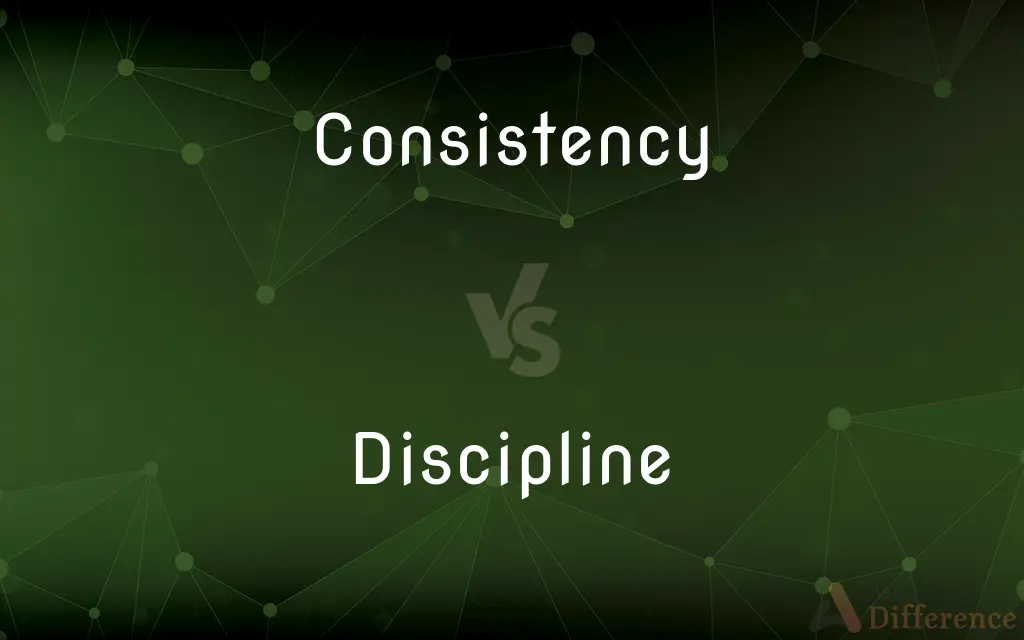Consistency vs. Discipline — What's the Difference?
By Fiza Rafique & Urooj Arif — Updated on April 9, 2024
Consistency involves regularly adhering to a set of behaviors or actions, enhancing skill and reliability, whereas discipline focuses on self-control and adherence to rules or standards, often to achieve a specific goal.

Difference Between Consistency and Discipline
Table of Contents
ADVERTISEMENT
Key Differences
Consistency refers to the practice of applying the same level of effort and commitment to a task or routine over time, which is crucial for developing habits and achieving long-term success. Discipline, on the other hand, is the ability to control one's feelings and overcome weaknesses, applying strict norms and behaviors towards oneself to reach a particular achievement or to maintain order.
While consistency plays a key role in reinforcing skills, habits, and routines by repeated application, discipline involves setting, following, and maintaining rules and standards, even in the face of challenges or temptations to deviate. Consistency helps in building momentum and making gradual progress, whereas discipline is often about the mental strength and willpower to stick to a plan or routine.
Consistency is often visible in the steady progress towards a goal, such as consistently practicing a musical instrument to master it. Discipline, however, might be observed in the rigorous scheduling and prioritization that allows for such practice to happen daily, despite other competing interests or distractions.
In terms of personal development, consistency is about making incremental improvements and sticking with a process, which can lead to mastery and expertise. Discipline, however, is more about the self-regulation and restraint necessary to ensure that one does not stray from their chosen path or give into immediate gratifications that could derail long-term objectives.
Both consistency and discipline are interconnected; discipline can foster consistency by establishing a framework within which one operates, while consistency reinforces discipline by turning structured behaviors into habits that require less mental effort over time.
ADVERTISEMENT
Comparison Chart
Definition
Regular application of effort towards a task
Self-control to follow rules and achieve goals
Key Focus
Repetition and habit formation
Self-regulation and adherence to standards
Role in Success
Builds momentum and gradual improvement
Enables focus and resilience against temptations
Visible in
Steady progress and routine
Strict adherence to plans despite challenges
Relation to Goals
Essential for achieving long-term success
Crucial for maintaining focus on the goal
Requires
Commitment to continue despite monotony
Mental strength to resist deviations
Outcome
Mastery and expertise
Achievement of specific goals and maintenance of order
Compare with Definitions
Consistency
About regularity in actions or behavior.
Consistency in waking up early made his mornings more productive.
Discipline
Exercising control to follow specific rules or goals.
His discipline in diet and exercise transformed his health.
Consistency
Steadily adhering to the same practices or standards.
His consistency in studying every day improved his grades significantly.
Discipline
Enables focus and prioritization.
His discipline in time management allowed him to balance work and study.
Consistency
Essential for habit formation and skill development.
Consistency in practice led her to master the violin.
Discipline
Involves restraint and mental willpower.
Discipline kept him focused on his studies, even during the holidays.
Consistency
Reflected in reliable performance and progress.
The team's consistency resulted in their seasonal success.
Discipline
About self-regulation and overcoming temptations.
Through discipline, she resisted the urge to procrastinate.
Consistency
Key to long-term achievements.
Their consistency in quality control earned the company a top industry award.
Discipline
Fundamental for maintaining order and achieving objectives.
The discipline required to save money helped her buy a house.
Consistency
In classical deductive logic, a consistent theory is one that does not lead to a logical contradiction. The lack of contradiction can be defined in either semantic or syntactic terms.
Discipline
Discipline is action or inaction that is regulated to be in accordance (or to achieve accord) with a particular system of governance. Discipline is commonly applied to regulating human and animal behavior to its society or environment it belongs.
Consistency
Consistent behaviour or treatment
The consistency of measurement techniques
Discipline
Training expected to produce a specific character or pattern of behavior, especially training that produces moral or mental improvement
Was raised in the strictest discipline.
Consistency
The way in which a substance holds together; thickness or viscosity
The sauce has the consistency of creamed butter
Discipline
Control obtained by enforcing compliance or order
Military discipline.
Consistency
Agreement or logical coherence among things or parts
A rambling argument that lacked any consistency.
Discipline
Controlled behavior resulting from disciplinary training; self-control
Dieting takes a lot of discipline.
Consistency
Correspondence among related aspects; compatibility
Questioned the consistency of the administration's actions with its stated policy.
Discipline
A state of order based on submission to rules and authority
A teacher who demanded discipline in the classroom.
Consistency
Reliability or uniformity of successive results or events
Pitched with remarkable consistency throughout the season.
Discipline
Punishment intended to correct or train
Subjected to harsh discipline.
Consistency
Degree of density, firmness, or viscosity
Beat the mixture to the consistency of soft butter.
Discipline
A set of rules or methods, as those regulating the practice of a church or monastic order.
Consistency
Local coherence.
Discipline
A branch of knowledge or teaching
The discipline of mathematics.
Consistency
Correspondence or compatibility.
Discipline
To train by instruction and practice, as in following rules or developing self-control
The sergeant disciplined the recruits to become soldiers.
Consistency
Reliability or uniformity; the quality of being consistent.
They want to achieve a high degree of consistency in their process and their product.
Discipline
To punish in order to gain control or enforce obedience.
Consistency
The degree of viscosity of something.
Mix it until it has the consistency of a thick paste.
Discipline
To impose order on
Needed to discipline their study habits.
Consistency
(logic) Freedom from contradiction; the state of a system of axioms such that none of the propositions deduced from them are mutually contradictory.
Discipline
A controlled behaviour; self-control.
Consistency
(obsolete) Firmness of constitution or character; substantiality; durability; persistency.
Discipline
An enforced compliance or control.
Consistency
The property of holding together and retaining its shape;
When the dough has enough consistency it is ready to bake
Discipline
A systematic method of obtaining obedience.
Consistency
A harmonious uniformity or agreement among things or parts
Discipline
A state of order based on submission to authority.
Consistency
Logical coherence and accordance with the facts;
A rambling argument that lacked any consistency
Discipline
A set of rules regulating behaviour.
Consistency
(logic) an attribute of a logical system that is so constituted that none of the propositions deducible from the axioms contradict one another
Discipline
A punishment to train or maintain control.
Discipline
A specific branch of knowledge or learning.
Discipline
A category in which a certain art, sport or other activity belongs.
Discipline
(transitive) To train someone by instruction and practice.
Discipline
(transitive) To teach someone to obey authority.
Discipline
(transitive) To punish someone in order to (re)gain control.
Discipline
(transitive) To impose order on someone.
Discipline
The treatment suited to a disciple or learner; education; development of the faculties by instruction and exercise; training, whether physical, mental, or moral.
Wife and children are a kind of discipline of humanity.
Discipline aims at the removal of bad habits and the substitution of good ones, especially those of order, regularity, and obedience.
Discipline
Training to act in accordance with established rules; accustoming to systematic and regular action; drill.
Their wildness lose, and, quitting nature's part,Obey the rules and discipline of art.
Discipline
Subjection to rule; submissiveness to order and control; habit of obedience.
The most perfect, who have their passions in the best discipline, are yet obliged to be constantly on their guard.
Discipline
Severe training, corrective of faults; instruction by means of misfortune, suffering, punishment, etc.
A sharp discipline of half a century had sufficed to educate us.
Discipline
Correction; chastisement; punishment inflicted by way of correction and training.
Giving her the discipline of the strap.
Discipline
The subject matter of instruction; a branch of knowledge.
Discipline
The enforcement of methods of correction against one guilty of ecclesiastical offenses; reformatory or penal action toward a church member.
Discipline
Self-inflicted and voluntary corporal punishment, as penance, or otherwise; specifically, a penitential scourge.
Discipline
A system of essential rules and duties; as, the Romish or Anglican discipline.
Discipline
To educate; to develop by instruction and exercise; to train.
Discipline
To accustom to regular and systematic action; to bring under control so as to act systematically; to train to act together under orders; to teach subordination to; to form a habit of obedience in; to drill.
Ill armed, and worse disciplined.
His mind . . . imperfectly disciplined by nature.
Discipline
To improve by corrective and penal methods; to chastise; to correct.
Has he disciplined Aufidius soundly?
Discipline
To inflict ecclesiastical censures and penalties upon.
Discipline
A branch of knowledge;
In what discipline is his doctorate?
Teachers should be well trained in their subject
Anthropology is the study of human beings
Discipline
A system of rules of conduct or method of practice;
He quickly learned the discipline of prison routine
For such a plan to work requires discipline
Discipline
The trait of being well behaved;
He insisted on discipline among the troops
Discipline
Training to improve strength or self-control
Discipline
The act of punishing;
The offenders deserved the harsh discipline they received
Discipline
Train by instruction and practice; especially to teach self-control;
Parents must discipline their children
Is this dog trained?
Discipline
Punish in order to gain control or enforce obedience;
The teacher disciplined the pupils rather frequently
Common Curiosities
How can discipline lead to consistency?
Discipline, by enforcing a structured approach and self-regulation, can help develop habits that lead to consistency.
Can you have discipline without consistency?
While discipline can initiate a structured approach, its benefits are fully realized when applied consistently over time.
Is consistency or discipline more important for success?
Both are crucial; discipline initiates and maintains a focused approach, while consistency ensures ongoing progress and habit formation.
Can consistency help in developing discipline?
Yes, consistent behavior can turn disciplined actions into habits, reducing the mental effort needed for self-regulation.
What role does consistency play in learning a new skill?
Consistency is key to reinforcing learning and practice, making it essential for skill acquisition and mastery.
How can one improve their consistency?
By setting realistic goals, creating routines, and gradually building habits through repeated action.
What strategies can enhance discipline?
Setting clear goals, identifying obstacles, creating action plans, and practicing self-awareness to manage temptations.
How can consistency impact mental health?
Positive routines and habits can improve mental health by reducing anxiety and improving self-esteem through achievements.
Can discipline be harmful if overemphasized?
Yes, excessive discipline can lead to stress, burnout, and a lack of flexibility, affecting well-being and creativity.
How do consistency and discipline differ?
Consistency is about regular application and steadiness in actions, while discipline is about self-control and adherence to set rules or goals.
How does discipline affect personal goals?
Discipline is crucial for setting, pursuing, and achieving personal goals by maintaining focus and overcoming obstacles.
How do consistency and discipline contribute to professional success?
They are foundational for meeting deadlines, achieving quality work, building reputation, and career advancement through reliable performance and self-regulation.
What are the benefits of combining consistency and discipline?
Combining both leads to sustained progress, habit formation, and the achievement of long-term goals with fewer deviations.
What challenges might one face when trying to maintain discipline?
Challenges include temptation, lack of motivation, fatigue, and external pressures that divert from set goals.
Why do some people struggle with consistency?
Reasons can include lack of motivation, unrealistic goals, absence of routine, or not seeing immediate results.
Share Your Discovery

Previous Comparison
Piped vs. Pipped
Next Comparison
Philosopher vs. SophistAuthor Spotlight
Written by
Fiza RafiqueFiza Rafique is a skilled content writer at AskDifference.com, where she meticulously refines and enhances written pieces. Drawing from her vast editorial expertise, Fiza ensures clarity, accuracy, and precision in every article. Passionate about language, she continually seeks to elevate the quality of content for readers worldwide.
Co-written by
Urooj ArifUrooj is a skilled content writer at Ask Difference, known for her exceptional ability to simplify complex topics into engaging and informative content. With a passion for research and a flair for clear, concise writing, she consistently delivers articles that resonate with our diverse audience.
















































